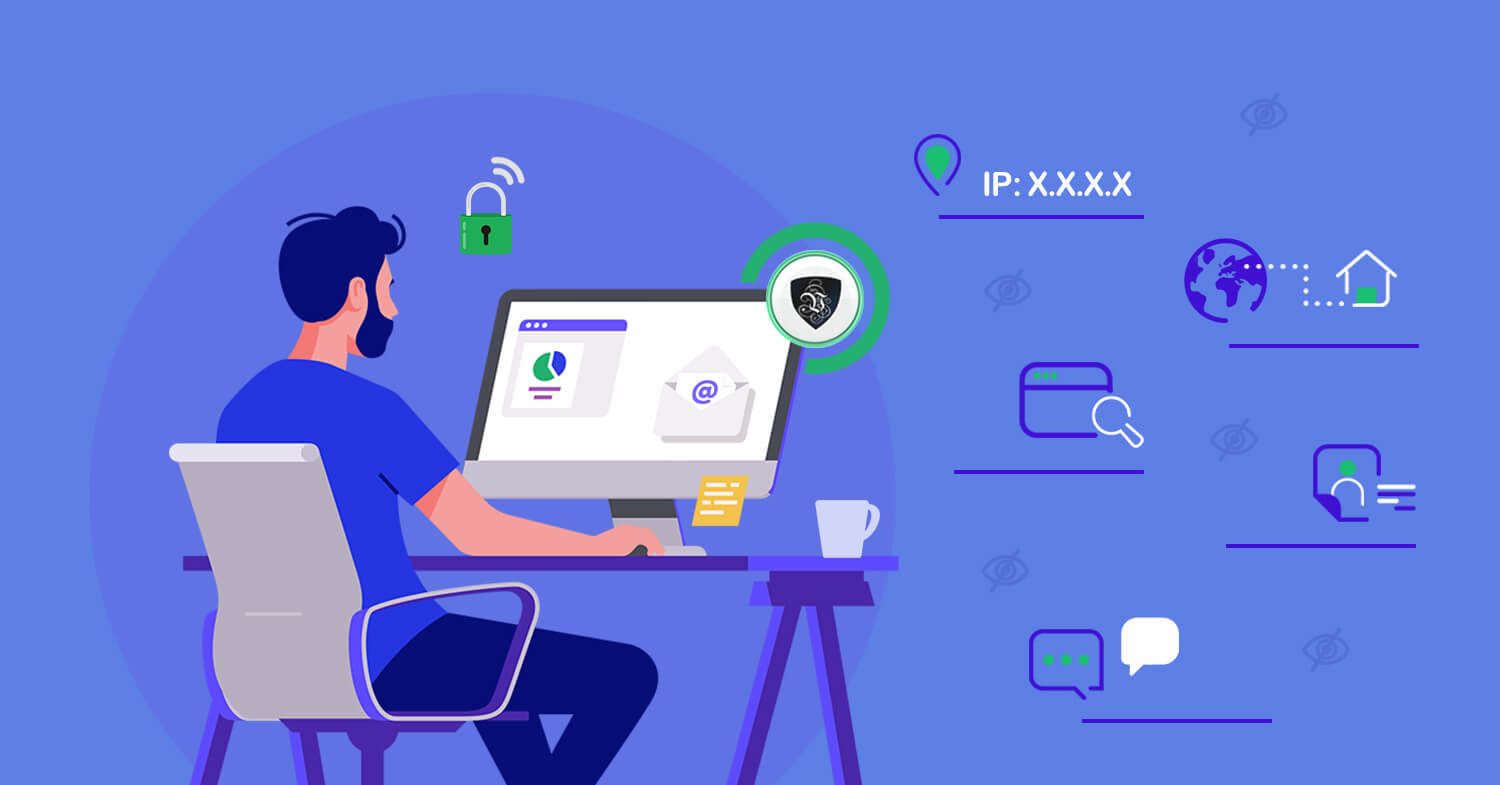Proxy servers play a significant role in the contemporary digital landscape, fulfilling a variety of functions that enhance both internet security and user experience by providing online anonymity and protection against cyber threats. These servers provide essential benefits, including privacy during internet browsing, improved internet performance, and the ability to bypass geographical restrictions, or geo-restriction, making them critical tools for numerous internet users seeking internet freedom. However, they are not without potential drawbacks, such as reduced speeds, security risks, and vulnerabilities to malware or compromised proxies. This article delves into the multifaceted realm of proxy servers, outlining their functions, types, and alternatives, thereby equipping readers with the knowledge necessary to navigate the complexities of online privacy, data privacy, and cybersecurity effectively.
What is the Purpose of a Proxy Server?
The primary purpose of a proxy server is to act as an intermediary between the user and the internet, thereby enhancing internet security by masking the user’s IP address, providing anonymity, and offering protection against online fraud and phishing attacks. This functionality contributes to improved online privacy and data protection.
Additionally, proxy servers can facilitate web scraping, enable load balancing, and assist in circumventing restrictions imposed by firewalls or geographical barriers, thus bypassing censorship.
Consequently, they serve as valuable tools for both individual users and corporate networks in maintaining their digital footprint, accessing restricted content, and ensuring compliance with privacy laws and regulations.
1. Improving Security and Privacy
Proxy servers play a significant role in enhancing security and privacy by providing users with anonymity and masking their IP addresses. This functionality is critical in preventing user tracking and eavesdropping by malicious websites.
These advanced systems employ encryption techniques that cloak user data as it traverses the internet, rendering it unintelligible to unauthorized parties. This capability is particularly vital in today’s digital landscape, where concerns regarding online privacy are at an all-time high, exacerbated by increasing cyber threats such as identity theft and data breaches.
For instance, a remote worker accessing sensitive company files through an unsecured network can utilize a proxy server to safeguard their communications from potential surveillance, while students conducting online research can bypass geographical content restrictions without disclosing their actual locations.
In scenarios where businesses are analyzing market trends, proxy servers facilitate data scraping without revealing corporate IP addresses, thus protecting their commercial interests.
2. Enhancing Performance
The implementation of data caching techniques significantly enhances the overall performance of proxy servers by reducing network latency, optimizing bandwidth usage, and ensuring improved connection stability for users accessing web content.
This efficient caching mechanism enables frequently requested data to be stored closer to users, resulting in faster load times and enhanced responsiveness.
Proxy servers also facilitate load balancing, which evenly distributes incoming traffic across multiple servers, thereby optimizing network performance and connection stability. This approach not only improves performance and speed but also adds a layer of reliability by minimizing the risk of server overload, ensuring scalability and cost-effectiveness.
By acting as intermediaries, these servers alleviate the burden on the origin server, allowing it to operate efficiently and seamlessly. This ultimately leads to an enhanced user experience characterized by increased speed and reliability.
3. Bypassing Geographical Restrictions
Proxy servers serve as effective solutions for bypassing geographical restrictions, enabling users to circumvent geo-blocking and content filtering enforced by internet service providers (ISPs) or governmental authorities, thus protecting digital rights and promoting user trust.
These versatile tools not only provide access to a wider range of content but also play a critical role in overcoming internet censorship imposed by authoritarian regimes. For example, individuals seeking information or entertainment from platforms that are unavailable in their region can utilize these servers to connect through different geographical locations, thereby masking their actual IP addresses.
Furthermore, proxy servers facilitate remote access to corporate networks, allowing employees to securely connect to their organization’s resources from any location, supporting corporate use and ensuring service reliability. This functionality is essential for businesses that rely on a global talent pool and is vital for maintaining operational flexibility in an increasingly interconnected world.
What are the Different Types of Proxy Servers?
There are various types of proxy servers, each designed to fulfill specific purposes in enhancing internet security, data privacy, and online anonymity.
These include:
- Transparent proxies
- Anonymous proxies
- Reverse proxies
- HTTP proxies
- SOCKS proxies
All of which cater to different user requirements and configurations.
1. Web Proxy
A web proxy, commonly known as an HTTP proxy, functions as a gateway that enables users to access the internet while providing a layer of anonymity by concealing their original IP address.
These proxies serve as intermediaries between the user and various websites, meaning that requests made to the web are transmitted through the proxy server rather than directly from the user’s device. This process not only helps to obscure user identification but also facilitates the filtering of unwanted content.
Consequently, many individuals utilize web proxies to circumvent geographical restrictions, thereby enhancing access to websites that may be blocked in specific regions.
For instance, travelers frequently depend on such proxies to access familiar services, such as streaming platforms or social media, while overseas, all while ensuring that their online activities remain private and secure.
2. Transparent Proxy
Transparent proxies are frequently utilized for monitoring and content filtering, as they do not alter requests or responses. This characteristic allows organizations to enforce access control without affecting the user’s browsing experience.
Such capabilities render transparent proxies ideal tools for network management, enabling businesses to track user activity and ensure adherence to internal policies. By implementing these proxies, companies can effectively manage content access, filtering out potentially harmful or distracting websites.
While transparent proxies offer advantages in monitoring and security, it is essential to consider the implications for user privacy. Continuous observation may raise concerns among employees regarding data scrutiny.
In corporate networks, transparent proxies can facilitate various use cases, ranging from bandwidth optimization to enhancing the overall performance of online applications, ultimately contributing to a robust and secure digital environment.
3. Anonymous Proxy
Anonymous proxies are specifically designed to provide a heightened level of anonymity by masking the user’s identity and IP address, crucial for tracking prevention and protecting online identity. This capability is essential in preventing user tracking and preserving online privacy.
In contrast to traditional proxies, which may simply reroute internet traffic without enhancing security, these specialized services effectively safeguard the user’s information. This increased protection is particularly significant in today’s digital landscape, where individuals often seek to navigate various online environments discreetly or access geo-restricted content.
For example, journalists operating in oppressive regimes or activists requiring secure communication frequently depend on such anonymity to protect their identities and bypass censorship. Additionally, casual users who wish to browse unmonitored websites or avoid targeted advertisements find anonymous proxies to be invaluable tools for maintaining their privacy and ensuring a safer online experience.
4. High Anonymity Proxy
High anonymity proxies, commonly referred to as elite proxies, provide the highest level of privacy by completely concealing the user’s IP address and not disclosing the use of a proxy, thereby ensuring maximum user anonymity, data protection, and defense against DDoS protection.
These proxies function as a protective barrier, obscuring the user’s online activities from unauthorized surveillance, enhancing overall digital security, and preventing data leaks. By routing connections through secure servers, they mitigate not only IP tracking but also potential data breaches, which is critical for individuals who prioritize confidentiality.
High anonymity proxies are particularly well-suited for a range of applications, including accessing geo-restricted content, circumventing internet censorship, securely conducting sensitive transactions, and supporting digital privacy tools.
Users, especially those in professions that handle confidential information or individuals seeking to maintain their privacy while browsing, derive significant advantages from the superior anonymity solutions offered by these proxies, promoting digital privacy and online anonymity.
What are the Potential Pitfalls of Using a Proxy Server?
While proxy servers provide numerous advantages, they also present potential drawbacks, including reduced internet speeds, insufficient encryption, vulnerability to malware risks, and potential logging policies by service providers.
These issues can compromise user security and negatively impact the overall online experience.
1. Slower Internet Speeds
Utilizing a proxy server may occasionally result in reduced internet speeds due to increased network latency, ISP throttling, and the additional processing steps required for data to traverse the proxy.
The configuration of the proxy is a critical factor in determining overall performance, as settings such as user authentication and encryption can introduce added processing time. Additionally, the geographical distance between the user and the proxy server can significantly impact response times; a server located closer to the user typically yields faster speeds. Protocol support, such as HTTP, HTTPS, and SOCKS, also plays a crucial role in enhancing network performance and reducing latency.
Other considerations, such as network congestion, ISP throttling, and the overall available bandwidth, also play a role in the efficiency of data transmission. While users may find that proxies provide advantages such as enhanced anonymity and access to restricted content, it is essential to carefully evaluate these benefits against potential drawbacks in terms of speed and reliability. Digital privacy tools, such as residential proxies and datacenter proxies, can offer varied transparency levels and privacy.
2. Lack of Encryption and Security Risks
Many proxy servers lack encryption, which can result in data leaks and expose users to significant security vulnerabilities, particularly when accessing sensitive information. These compromised proxies can exacerbate the risks associated with data privacy and digital footprint exposure.
In the absence of proper encryption, individuals utilizing these proxies face the risk of having their personal data intercepted by malicious actors. This risk is exacerbated on unsecured connections, where data is transmitted in plain text, making it easily accessible to anyone equipped with the appropriate tools. The lack of IP address masking further contributes to these security risks.
For users who prioritize their digital security, it is essential to consider alternatives such as Virtual Private Networks (VPNs) or encrypted proxy services. These solutions provide robust encryption protocols that not only protect personal information but also help maintain online privacy.
By selecting a reputable VPN service, users can establish secure tunnels for their data, effectively reducing the risks associated with unsecured connections. VPNs also provide additional benefits, such as bypassing censorship and accessing geo-restricted content, promoting internet freedom and user control.
3. Risk of Malware, Hacking, and Security Risks
The use of untrusted proxy servers can expose users to significant risks, including malware exposure and potential hacking attempts, as these servers may inadvertently route traffic through malicious sites. This vulnerability underscores the importance of internet security and performing thorough risk assessments.
To ensure a secure online experience, it is imperative for individuals to select well-established and reputable proxy service providers. These trusted services typically implement robust security protocols, including encryption and stringent authentication measures, to safeguard user data from unauthorized access.
By prioritizing user security and exercising diligence in the selection of proxy servers, individuals can substantially mitigate their vulnerability to online threats. Staying informed about best practices for using proxies is essential, as this knowledge can help protect personal information from potential breaches and maintain privacy while browsing the internet. Awareness of logging policies and service reliability is also crucial for maintaining data integrity.
4. Dependence on the Reliability of the Proxy Server
The effectiveness of a proxy server is significantly dependent on its reliability and connection stability. These factors can be adversely affected by configuration issues or server outages, which may result in a disrupted user experience. Regular maintenance and performance monitoring are key to ensuring optimal service reliability and user satisfaction.
When the reliability of a proxy server is compromised, users may encounter throttled speeds, unexpected disconnections, or even complete inaccessibility to the services upon which they depend. This unreliability not only leads to user frustration but also complicates routine tasks, particularly for individuals who require consistent access for work or streaming purposes.
To address these connectivity issues, users may consider several troubleshooting steps:
- First, confirming that the proxy settings are correctly configured can resolve many problems.
- It is also crucial to check whether the proxy server is operational and not experiencing outages.
- Additionally, examining the device’s network settings and considering updates or reboots can often restore functionality.
Understanding how to navigate these challenges can significantly enhance the experience of interacting with proxy systems. For tech-savvy users and novice users alike, knowledge of troubleshooting techniques and service providers can make a significant difference in maintaining a stable and efficient online connection.
How to Use a Proxy Server?
Utilizing a proxy server necessitates the configuration of your device or application to connect through the proxy. This process may involve addressing potential configuration issues and ensuring proper user authentication to facilitate secure access. Awareness of potential vulnerabilities and compliance with privacy laws and regulations can further safeguard against cybersecurity threats.
1. Configuring Proxy Settings on Your Browser
To configure proxy settings on your browser, it is necessary to navigate to the settings menu, where you can input the proxy server details to improve your online user experience and privacy. Proper configuration can also enhance internet security and optimize network topology for better performance metrics.
Taking the time to accurately enter these details is essential, as incorrect settings may result in connectivity issues or an inability to access specific websites. Each browser, whether it is Chrome, Firefox, or Edge, has a slightly different procedure for accessing these configurations; however, the fundamental principles remain consistent.
Users must ensure that they possess both the correct proxy address and the corresponding port number. This meticulous attention to detail facilitates smoother browsing, potentially quicker access to resources, and an additional layer of anonymity, as web traffic is routed through the designated server.
2. Using a Proxy Service or Software
Utilizing a proxy service or software tools can streamline the process of connecting through a proxy server, providing users with greater control over settings while often ensuring enhanced reliability and performance. This can be particularly beneficial for gaming, streaming services, and accessing educational resources, where high anonymity and content access are paramount.
These tools are specifically designed to be user-friendly, enabling individuals to manage their connections seamlessly without necessitating technical expertise. Improved reliability is particularly advantageous for businesses and individuals who depend on uninterrupted access to online resources.
Dedicated proxies offer additional features such as customizable IP rotation and access to geo-restricted content, allowing users to adapt their internet usage to meet specific requirements.
This level of control not only enhances personal browsing experiences but also optimizes operational efficiency for organizations that require secure and consistent online activities.
What are the Alternatives to Using a Proxy Server?
When evaluating alternatives to proxy servers, individuals commonly assess options such as Virtual Private Networks (VPNs), the Tor Browser, and proxy chains. These alternatives offer varied benefits for bypassing censorship and maintaining online anonymity while adhering to digital rights and privacy laws.
Each of these alternatives offers distinct advantages and trade-offs concerning online privacy and security.
1. Virtual Private Network (VPN)
A Virtual Private Network (VPN) delivers robust online privacy through strong encryption and a secure tunnel for internet traffic, positioning itself as a superior alternative to traditional proxy servers in the prevention of user tracking.
In contrast to proxy servers, which typically reroute only browser traffic and may leave other applications exposed, a VPN encrypts all data transmitted to and from a device. This comprehensive encryption ensures that whether a user is streaming, browsing, or utilizing applications, their information remains concealed from unauthorized access, thereby providing extensive digital protection.
Furthermore, VPNs play a crucial role in safeguarding against cyber threats such as data theft and hacking, particularly when accessing public Wi-Fi networks. They also provide significant protection against DDoS attacks and online fraud, ensuring a secure and private browsing experience.
In situations where individuals require access to restricted content or need to maintain confidentiality—such as journalists or professionals working remotely—employing a VPN guarantees that their online activities are kept private and secure, thereby demonstrating its advantages over simpler proxy solutions. VPNs offer robust security protocols that enhance digital privacy and user trust.
2. Tor Browser
The Tor Browser is specifically designed to enhance user anonymity and privacy by routing internet traffic through multiple layers of encryption. It facilitates access to the dark web while effectively safeguarding against user tracking. Tor’s unique architecture supports the prevention of tracking and monitoring by external entities.
This distinctive architecture distinguishes it from standard internet browsing experiences and conventional proxy servers, which often do not provide the same level of security.
By employing a network of volunteer-operated servers, Tor ensures that data packets traverse several nodes, rendering it exceedingly difficult for any individual or entity to trace online activities back to the original user. As a result, individuals who prioritize privacy can navigate the internet with assurance, knowing that their digital footprint is significantly minimized.
In contrast to traditional proxies, which may log user activity or expose vulnerabilities, the Tor Browser underscores a steadfast commitment to protecting personal information and maintaining anonymity online.
3. Proxy Chains
Proxy chains allow users to route their internet traffic through multiple proxies, thereby enhancing anonymity and adding layers of security. This capability is particularly advantageous for individuals concerned about privacy. With support for various protocols and IP address masking, proxy chains are ideal for those navigating complex network environments or engaging in digital marketing strategies.
By connecting through several intermediary servers, the user’s real IP address is concealed, complicating efforts by third parties to trace online activities back to the original user. This technique not only safeguards personal information but also facilitates the bypassing of region-based restrictions and censorship imposed by certain governments or organizations.
Individuals seeking secure communications, such as activists or journalists operating in sensitive environments, may find proxy chains essential for maintaining their safety. Additionally, organizations may utilize this method to protect sensitive data while conducting research on competitors without disclosing their identity.
Frequently Asked Questions
What is a proxy server and what is its purpose?
A proxy server acts as an intermediary between a user’s computer and the internet. Its purpose is to enhance security, increase speed, and provide anonymity for online activities. Proxies are widely utilized in scenarios like web scraping, load balancing, and managing geo-restriction barriers for accessing regional content.
How does a proxy server work?
A user’s computer connects to a proxy server, which then requests information from the internet on behalf of the user. The proxy server then relays the information back to the user, acting as a middleman between the user and the internet. This process helps in IP address masking and maintaining online anonymity.
What are the benefits of using a proxy server?
Proxy servers offer several benefits, such as improving online security by hiding a user’s IP address, caching frequently accessed web pages to increase speed, and bypassing geo-restriction and censorship for accessing certain websites. They also help in improving internet security and data privacy.
What are the potential pitfalls of using a proxy server?
One potential pitfall of using a proxy server is that it can introduce another point of failure, making internet access dependent on the proxy server’s functionality. Additionally, some proxy servers may log user activity, compromising privacy and increasing the risk of data leaks. There are also concerns about security risks, such as compromised proxies and potential malware.
Moreover, users might face compatibility issues and configuration challenges, which can be troublesome for novice users. Corporate use may require awareness of privacy laws and regulations.
One potential pitfall of using a proxy server is that it can introduce another point of failure, making internet access dependent on the proxy server’s functionality. Additionally, some proxy servers may log user activity, compromising privacy and increasing the risk of data leaks. There are also concerns about security risks, such as compromised proxies and potential malware.
How can I set up a proxy server?
Setting up a proxy server requires technical knowledge and access to a dedicated server. Alternatively, users can use a proxy server provided by a third party service or use a virtual private network (VPN) to access the internet anonymously. VPNs can help in bypassing ISP throttling and improving network performance. For enhanced security, users should consider encryption and user authentication protocols.
Regular maintenance and troubleshooting are important for ensuring service reliability and connection stability. Users can also look into the cost-effectiveness and scalability of different service providers, as well as their customer support and logging policies.
Setting up a proxy server requires technical knowledge and access to a dedicated server. Alternatively, users can use a proxy server provided by a third party service or use a virtual private network (VPN) to access the internet anonymously. VPNs can help in bypassing ISP throttling and improving network performance. For enhanced security, users should consider encryption and user authentication protocols.
Are there different types of proxy servers?
Yes, there are several types of proxy servers, including forward proxies, reverse proxies, open proxies, transparent proxies, residential proxies, and datacenter proxies. Each type serves a different purpose, such as caching, load balancing, traffic routing, or filtering web content. They vary in transparency level, protocol support (HTTP, HTTPS, SOCKS, SSL), and user scenarios like streaming services, gaming, and torrenting.
Performance metrics such as latency, speed, and encryption levels are important factors to consider. Additionally, the choice of proxy can impact user control, access control, and digital footprint, and can be influenced by digital privacy tools and market trends.
Yes, there are several types of proxy servers, including forward proxies, reverse proxies, open proxies, transparent proxies, residential proxies, and datacenter proxies. Each type serves a different purpose, such as caching, load balancing, traffic routing, or filtering web content. They vary in transparency level, protocol support (HTTP, HTTPS, SOCKS, SSL), and user scenarios like streaming services, gaming, and torrenting.














